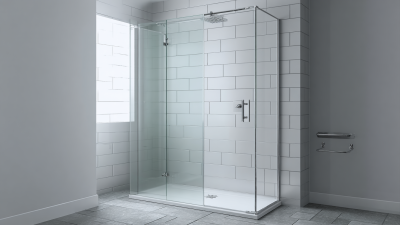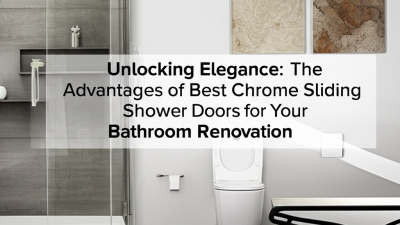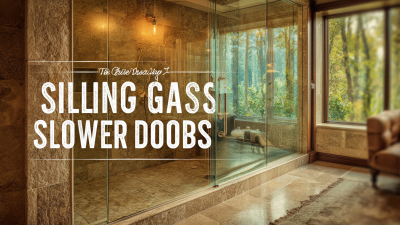- +8613567125921
- +8613567125921
- office@hzkf-bath.com
- 1224594647
 In today's evolving bathroom design landscape, the desire for an elegant and functional bathing space has led to increased interest in alternatives to traditional setups, particularly for those considering a Shower With Sliding Glass Door. According to a report by Statista, the global bathroom accessories market is projected to reach approximately $150 billion by 2024, highlighting a significant trend towards modernizing our personal spaces.
In today's evolving bathroom design landscape, the desire for an elegant and functional bathing space has led to increased interest in alternatives to traditional setups, particularly for those considering a Shower With Sliding Glass Door. According to a report by Statista, the global bathroom accessories market is projected to reach approximately $150 billion by 2024, highlighting a significant trend towards modernizing our personal spaces.
Sliding glass doors not only enhance aesthetic appeal but also optimize space in smaller bathrooms, making them a preferred choice among buyers. Additionally, the National Kitchen & Bath Association (NKBA) indicates that nearly 60% of homeowners are prioritizing innovative materials and designs that blend style with efficiency, indicating a shift towards smarter, more versatile solutions in bathroom renovation.
This blog will explore innovative alternatives that cater to global buyers seeking to elevate their shower experience beyond the conventional.
When it comes to designing modern bathrooms, sliding glass doors have long been the go-to choice for shower enclosures. However, a growing awareness of the limitations posed by glass—such as maintenance, fragility, and cost—has led many homeowners to seek innovative alternatives. Recent industry reports indicate that the demand for non-glass shower enclosures has surged, with a projected 15% annual growth rate in the market segment of alternative materials through 2025.
 One prominent option gaining traction is acrylic shower doors, which are not only lightweight but also resistant to cracking and chipping. According to a study by the National Kitchen and Bath Association, acrylic materials are favored for their ease of installation and lower maintenance requirements compared to traditional glass. Furthermore, many brands now offer stylish designs that can mimic the appearance of glass, enhancing the aesthetic appeal without the associated drawbacks.
One prominent option gaining traction is acrylic shower doors, which are not only lightweight but also resistant to cracking and chipping. According to a study by the National Kitchen and Bath Association, acrylic materials are favored for their ease of installation and lower maintenance requirements compared to traditional glass. Furthermore, many brands now offer stylish designs that can mimic the appearance of glass, enhancing the aesthetic appeal without the associated drawbacks.
Another exciting alternative is the use of semi-frameless or framed polymer options, which provide additional durability and flexibility in design. A recent market analysis highlighted that these alternatives are increasingly popular among eco-conscious consumers, as they often come from recyclable materials and offer better energy efficiency in manufacturing. As the industry evolves, buyers are encouraged to explore these innovative solutions that blend functionality with style, paving the way for a new standard in bathroom renovations.
When considering alternatives to traditional sliding glass shower doors, durability and maintenance are paramount concerns. Non-glass solutions, such as acrylic or vinyl options, can provide a robust barrier against moisture while being lighter and less prone to shattering. These materials often resist scratching better than glass, which can require careful cleaning to maintain its clarity. However, it’s worth noting that some non-glass surfaces may develop yellowing or wear over time, necessitating regular maintenance to extend their lifespan.
For those considering a non-glass shower option, here are a few tips:
In recent years, the design landscape for non-glass shower doors has evolved significantly, allowing homeowners and designers to creatively integrate alternative materials and styles into their bathrooms. Instead of traditional glass enclosures, bespoke shower enclosures featuring frames in various sizes and finishes are increasingly popular. This trend not only enhances the aesthetic appeal but also adds a touch of customization—allowing for unique designs with fluted patterns or colored finishes.
One of the key trends to look out for is the integration of walk-in showers, which offer both sophistication and practicality. These designs emphasize open spaces and can be fitted with stylish seating options that enhance comfort and convenience. According to industry reports, the demand for walk-in showers has surged by over 25% as homeowners prioritize self-care and luxurious experiences in their daily routines.
**Tips:** When selecting non-glass shower doors, consider utilizing materials like acrylic or high-quality composites that mimic the sleek look of glass while ensuring durability and ease of cleaning. Additionally, think about incorporating elements such as matte finishes or innovative sliding mechanisms to maximize space and functionality in tighter bathrooms.
| Design Element | Material Type | Pros | Cons | Average Cost (USD) |
|---|---|---|---|---|
| Bi-Fold Doors | Aluminum | Space-saving, modern aesthetic | Limited privacy | $600 - $1200 |
| Curtain Shower Enclosure | Fabric | Variety of designs, easy to replace | Less durable | $50 - $200 |
| Folding Screens | Wood, Acrylic | Aesthetic appeal, can be moved | Requires more space | $200 - $800 |
| Solid Panel | PVC, Composite | Water resistant, maintenance-free | Limited design flexibility | $300 - $1000 |
| Archway or Open Design | N/A | Creates an open feel | Less privacy | $1000 - $3000 |
When exploring cost-effective alternatives to sliding glass doors for showers, buyers are increasingly leaning towards innovative solutions that combine functionality, aesthetic appeal, and budget considerations. Traditional sliding glass doors can often be costly, not only in terms of initial investment but also regarding installation and maintenance. As a result, many homeowners are turning to options such as shower curtains, bi-fold doors, or even acrylic panels, which provide a more economical solution without sacrificing style or quality.

Shower curtains are perhaps the most straightforward and affordable choice. They come in a variety of materials, colors, and patterns, allowing buyers to easily customize their bathroom decor. Bi-fold doors, on the other hand, offer a modern look while optimizing space and reducing clutter. Another growing trend is the use of acrylic panels or tempered glass which, while still glass, are often lighter and more affordable than traditional sliding doors. This not only enhances the visual appeal of the shower area but also simplifies installation and maintenance, making them a smart investment for budget-conscious buyers.
In today's design landscape, sustainability is at the forefront of innovative shower solutions. Eco-friendly materials and practices are not only beneficial for the planet but also enhance the aesthetic appeal of any bathroom. When considering alternatives to traditional sliding glass doors, many consumers are opting for sustainable options, such as recycled glass or bamboo, which significantly reduce environmental impact while maintaining elegance.
Furthermore, embracing water-efficient fixtures can lead to substantial conservation efforts. Incorporating low-flow showerheads and smart water monitoring systems helps to minimize water waste without compromising the shower experience. Additionally, using environmentally friendly sealants and adhesives during installation ensures that harmful chemicals are kept in check, promoting healthier indoor air quality. As global buyers become more conscious of their ecological footprint, these sustainable practices in shower design are becoming a vital part of modern bathroom renovations.






